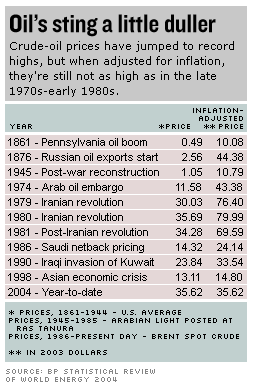NEW YORK (CNN/Money) -
Here we go again. Just as they did a month ago, crude oil prices are at record highs near $50 a barrel -- a level that makes investors around the world shudder.
And just as they did a month ago, energy experts and veteran market watchers disagree about how long the spike in energy prices might last.
Many analysts noted that hedge funds and other speculators, desperate for a hot market in which to play, have been inflating oil prices, which are already artificially high because of fear of terror attacks and supply disruptions in the Middle East, Russia and other parts of the world.
Other analysts, however, believe high prices could be sustainable, because of tighter supply and higher demand around the world, driven in part by emerging economies such as China and India.
Which ever side you buy into, there's little doubt that higher prices are having an impact.
Here's a look at some of the effects:
Consumer spending
Before clucking too much about the dangers of high oil prices, it's worth noting that, in inflation-adjusted dollars, crude oil is still not nearly as dear as it was in 1979. What's more, the U.S. economy is far less energy-dependent than it was then.
Still, higher energy prices do act as a kind of tax on consumers, draining discretionary income that could be spent on more fun stuff. This is critical for the broader economy, more than two-thirds of which is made up of consumer spending.

When oil spiked towards $50 in mid-August, gasoline prices stayed low, meaning the broader economic pain was limited.
During the current spike, however, gasoline prices are again threatening to cross $2 a gallon, and a new spending obstacle is cropping up: home heating oil prices, which have jumped in recent weeks to their highest level since early 2000.
Though the current price of oil is probably not recessionary, sustained prices above $60 -- a possibility, according to Morgan Stanley economists -- could be.
Corporate profits and stocks
Higher oil prices haven't been a huge drag on corporate profits (yet), but they're making a difference at the margins.
Of more than 200 chief financial officers surveyed in early September by Financial Executives International and Baruch College's Zicklin School of Business, just 19 percent said oil prices had hurt earnings. But about 30 percent said they would feel a "significant" pinch if oil were to hit $50 a barrel.
And sixty-five percent of those companies feeling the sting of oil had simply eaten the higher costs, instead of passing them on to consumers, hurting profits.
Though manufacturing firms are usually the hardest hit by high oil prices, some less-obvious victims have warned of lower earnings recently, including consumer-staple firms Colgate-Palmolive (CL: Research, Estimates) and Unilever (UL: Research, Estimates). Those companies had other problems cutting into profits, but high energy costs didn't help.
On the other side of the ledger, big oil companies such as Exxon Mobil (XOM: Research, Estimates), ChevronTexaco (CVX: Research, Estimates), BP (BP: Research, Estimates) and ConocoPhillips (COP: Research, Estimates) usually thrive on pricey crude.
Unfortunately, since many other firms will feel at least a little profit pain from oil, stock prices have been dragged down nearly every time crude oil has risen, and the same has been true in recent days.
"It's not going to make or break a bull or a bear market, but it's a negative," said James Awad, chairman of Awad Asset Management.
Inflation, bonds and the Fed
While oil has been rising, bond prices have, too, pushing yields -- which move opposite to price -- lower. For weeks, analysts have been trying to sort out what this means. Many note that hedge funds and speculators are likely causing some of the mischief in bonds, riding a hot market and setting it up for a fall.
But others wonder if bonds aren't saying something about the future course of inflation and economic growth. If companies aren't able to pass higher energy prices on to consumers, then their spending and hiring plans might suffer, inflation will stay tame, and economic growth will be weaker.
That would keep the Federal Reserve from raising interest rates as quickly as expected, meaning long-term interest rates are low for good reason.
"The big wild card becomes what the Fed does about it," said Drew Matus, senior economist at Lehman Brothers. "That's why the bond market is rallying -- rather than concentrate on the inflationary aspects of higher oil prices, the market thinks the Fed will focus on the growth aspects."
Currencies
For now, the only currencies feeling much pain from higher oil prices are those of industry-intensive countries that tend to use a lot of oil, Japan being the biggest and best example.
The U.S. dollar has fallen against the euro as oil has surged, possibly because of fear that higher oil prices would eventually fuel inflation and hurt the U.S. economy. But the dollar actually surged against the Japanese yen, hitting a new five-week high last week, as did the Nikkei index -- not coincidentally.
"Japan is really the industrialized country most heavily dependent on oil imports," said Ashraf Laidi, chief currency analyst at MG Financial in New York, "so the most direct impact of higher oil prices is on the Japanese yen."
Of course, the rapidly-growing Chinese economy guzzles its share of oil, too, and its currency would likely be affected, if not for the fact that China keeps its currency artificially weak anyway. At the G7 meeting on Friday, U.S. officials will likely pressure China to loosen its grip on the yuan, but higher oil prices could complicate the issue.

|

